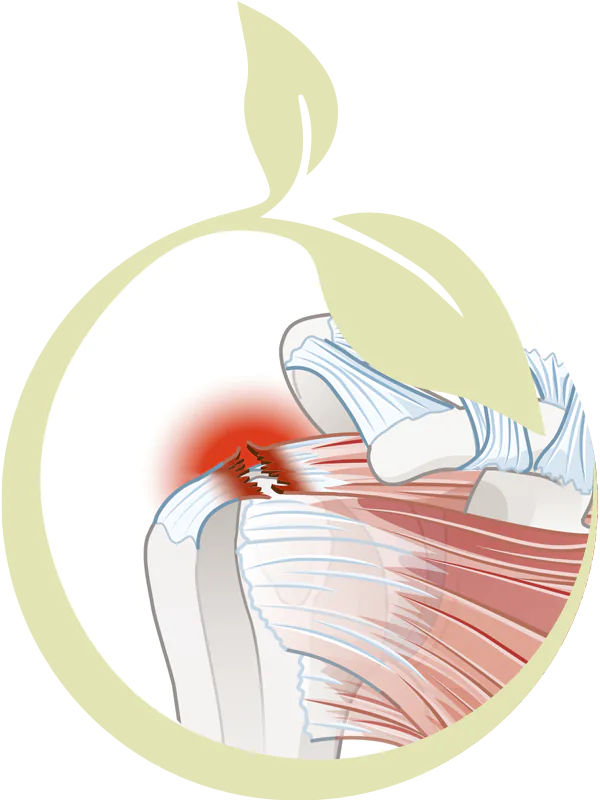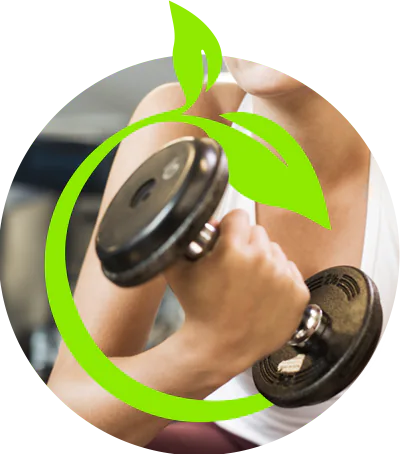Expert Calgary
Treatment for
Rotator Cuff Tears
Rotator Cuff Injuries
The tendons that connect your shoulder muscles and bones do a great deal of work every day. When a shoulder injury leaves these tendons overexerted, a painful rotator cuff tear can occur. Rotator cuff injuries are one of the most common underlying causes of shoulder pain. A rotator cuff injury can occur due to intense physical activity like contact sports or a simple overextension while reaching for something on a shelf. At Divergent Health, we have years of experience diagnosing and treating rotator cuff injuries in Calgary.
Book a Consult Today to Treat Rotator Cuff Injuries
Advanced Treatments for Rotator Cuff Tears
Understanding the available treatment options is crucial for optimal relief from rotator cuff pain. Discover the latest advancements and evidence-based strategies to help make informed decisions about your shoulder care journey:
Focused Shockwave Therapy
Focused Shockwave Therapy is a non-invasive treatment that delivers high-energy sound waves deep into injured tissue. These waves enhance blood flow and stimulate the healing process, helping to break down scar tissue and reduce inflammation, which can lead to pain relief and improved shoulder function.
Radial Shockwave Therapy
Radial Shockwave therapy emits mid-energy shockwaves that disperse outward from the treatment site. These shockwaves penetrate the affected shoulder tissue, stimulating blood flow and promoting tissue healing. Enhanced circulation can reduce inflammation and alleviate pain associated with rotator cuff tears.
Robotic Laser Therapy
Laser therapy directs a beam of light at the injured area. This light stimulates the tissues to heal by reducing inflammation, relieving pain, and increasing blood flow. The improved circulation brings essential nutrients to the rotator cuff, which can accelerate healing and promote a faster return to normal shoulder function.
TECAR Radio-frequency
TECAR therapy uses radio-frequency energy to generate heat deep within injured tissues. This promotes increased blood circulation to accelerate the healing process. Heat energy helps to reduce inflammation and alleviate pain, enhances the natural repair mechanisms of the body, and improves tissue flexibility and mobility.
Medical Management
Medical management helps alleviate pain from rotator cuff tears through various interventions to reduce inflammation, relieve discomfort, and promote healing. Medication may be administered to reduce inflammation and provide targeted relief in combination with physical therapy exercises and rehabilitation programs. Our expert clinicians can assess and recommend the best approach for your needs.
Physiotherapy
Physiotherapy addresses the underlying causes of the discomfort through a combination of techniques. Manual therapy improves flexibility and reduces muscle tightness around the shoulder joint. Our expert physiotherapists can prescribe specific exercises to strengthen the muscles that support the rotator cuff, enhancing stability and reducing pain.
Chiropractic Therapy
By performing manual adjustments, chiropractors can alleviate pressure on nerves that might be contributing to pain. Chiropractic care can help relax muscle tension and spasms around the rotator cuff, which can further reduce discomfort, promote stability and prevent future injury.
ARX Alpha Strength Training
ARX Alpha provides adaptive resistance training that precisely matches the user’s strength and range of motion. This customized resistance helps to safely strengthen the shoulder muscles and surrounding structures, improving stability and reducing strain on the rotator cuff.
ARX Omni Rehab Training
The ARX Omni system aids rotator cuff tear rehabilitation by offering adaptive resistance during shoulder exercises, ensuring safe muscle engagement. Its controlled resistance targets shoulder muscles, promoting recovery and stability without overloading the injured area. Customizable programming allows for tailored rehabilitation, facilitating optimal healing and functional recovery.
Kinesiology
Kinesiology focuses on targeted exercises to strengthen the muscles surrounding the shoulder joint. Through specific movements and techniques, kinesiologists aim to improve the shoulder’s range of motion, stability, and functionality. By addressing muscle imbalances and promoting proper biomechanics, kinesiology can contribute to the recovery process and help prevent future injuries.
Rapid Neuro Fasical Reset
Rapid Neurofascial Reset addresses imbalances in the body’s neurofascial system, which includes nerves and connective tissue. By targeting specific points and applying gentle pressure, RNFR may help alleviate tension and promote better function in the muscles surrounding the rotator cuff. This can improve range of motion, reduce pain, and enhance overall shoulder stability.
What Causes Rotator Cuff Injuries?
Rotator cuff tears can occur due to trauma, repetitive overhead activities, or degenerative changes associated with aging. Acute trauma, such as a fall onto an outstretched arm or a sudden forceful movement, can cause a tear in the rotator cuff tendons. Repetitive overhead activities, common in occupations like painting or construction, can gradually wear down the tendons and lead to tears. Additionally, degenerative changes in the rotator cuff tendons, often seen in older adults, can weaken the tissue and make it more prone to tearing, even with minor trauma.

The symptoms of a rotator cuff tear typically include pain, weakness, and limited range of motion in the affected shoulder. Weakness in the shoulder can make it difficult to perform everyday tasks like reaching or lifting objects overhead. Additionally, people may notice a decrease in shoulder mobility, particularly when trying to rotate or lift the arm. In some cases, individuals may experience swelling or tenderness around the shoulder joint. These symptoms can vary in severity depending on the size and location of the tear, with larger tears often causing more significant symptoms and functional limitations.
The Divergent Health Advantage for Shoulder Care
Divergent Health stands apart from other clinics with our comprehensive approach to treating rotator cuff issues. Our expert team of healthcare professionals works together to develop a personalized treatment plan tailored to your specific symptoms. This personalized approach ensures your condition is thoroughly evaluated and addressed, maximizing the effectiveness of your treatment plan and optimizing your path to recovery.
We have assembled a diverse team of highly skilled professionals comprising of:
Diagnosis & Treatment of Rotator Cuff Injuries
Our Calgary Healthcare team will diagnose a rotator cuff through an examination using X-rays and imaging techniques. An MRI can help to identify the breaking point in the shoulder’s tendons, making it possible to determine the exact position and depth of damage.
A minor rotator cuff injury may heal on its own with rest and a shoulder sling, whereas more advanced injuries could benefit from our specialized treatment options. Physical therapy can help restore your range of motion and return you to everyday routines.
Appointment for Shoulder Pain Doctor Near Me
If you have had a shoulder injury and are unsure what treatment is best for you, contact Divergent Health in Calgary for a professional assessment. Our team of experienced physicians understands how to treat complex injuries so you can return comfortably to a normal life. For more information or to schedule an appointment, call us at 587-325-0253.




